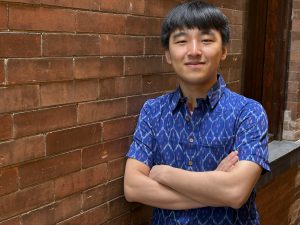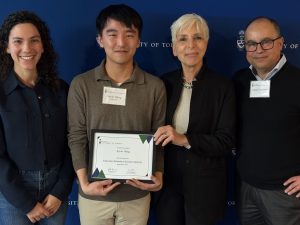
Issues of equity and fairness are prominent in the intellectually vast discipline of economics. These issues inspired Yunfei (Kevin) Wang in pursuit of his degree. After convocation, the Vancouverite will be taking his interests and training with him for a pre-doc research position at Stanford University in California.
“I didn’t come into U of T with a clear idea of what I wanted to research,” Kevin remembered. “But over time, as I got more exposure to real-world issues—through the news, podcasts like Planet Money, and my coursework—I started gravitating toward questions about inequality, fairness, and policy. That’s what led me to economics, and eventually to combining it with math and computer science. Now, I’m especially interested in how we can use data and rigorous methods to answer complex social questions.”
The pre-doctoral position will help Kevin gain valuable research experience while helping him solidify plans for PhD studies.
“At Stanford, I’ll be working closely with Hunt Allcott, whose research focuses on environmental policy using industrial organization tools,” the Innis College student explained. “He’s also done some fascinating work on social media and political polarization. I’ll likely be working on papers related to environmental policy, which is an area I’m really interested in. I’ll also be collaborating with José Ignacio Cuesta, who works on healthcare policy through an IO lens. It’s exciting because both areas tie back to the kinds of equity and policy questions I’ve been exploring during my undergrad.”

Those explorations have been successful with the Department of Economics. His paper, Fairness in Medical Triage Systems, was runner up in the Arthur Hosios Scholarship in Economics for 2024-25. In second year, he won third prize in the Third Annual Tech Econference for the presentation of his ECO225 paper Political Favoritism and Gender Bias in Foreign Aid.
Much of Kevin’s work as an undergraduate has touched on how decisions are made when resources are limited, and how fairness plays into those dynamics, but doing the work revealed an element that was missing. Proving causality.
“My honours thesis focused on racial disparities in traffic stops in the southern U.S., and while I found some patterns, proving causality was incredibly challenging,” Kevin said. “That experience really opened my eyes to how difficult it is to identify causal mechanisms in social science research. It also made me more curious about the theoretical foundations of causal inference, which I’ve been exploring through both economics and computer science frameworks.”
Part of the solution was to take ECO310, Empirical Industrial Organization with Professor Victor Aguirregabiria.
“I used to think I was more interested in empirical work, but after doing my honours thesis, I realized I missed some of the structure that theory provides,” he said. “I enjoyed setting up theoretical frameworks, and that’s why I think industrial organization might be a good fit—it sits right at the intersection of theory and empirical work. It’s still early days for me to decide exactly what I want to do for my PhD, but I’m leaning toward that space. The thesis helped me see how complex and nuanced real-world data can be, especially when you’re trying to make causal claims.”
Getting through his honours thesis, and the finish line to convocation, was not without its barriers. Like all economics program students, Kevin had to survive the introductory courses ECO101 and ECO102. It was a challenge Kevin re-lived as a learning assistant at the Economics Study Centre. The experience has given him two points of advice for first year students.
“The cliché is ‘don’t miss the forest for the trees,’ but I’d add that the trees are important too. In ECO101 and 102, you’re learning foundational tools like marginal cost, opportunity cost, and so on,” he said. “These might seem abstract at first, but they’re essential for understanding the bigger questions later. I think a lot of students finish those courses and think, ‘I don’t like economics,’ without realizing how much more there is to explore. Once you get to third and fourth year, you can take field courses that show you the full beauty of the discipline. That’s when it really starts to come alive.”
He’d also like to remind new students that there’s more to university than going to class and doing course research.
“I got involved with the Innis College Student Society, helped organize socials, and played in the Hart House band,” he remembered. “All of those experiences were incredibly rewarding. U of T wouldn’t have been as meaningful if I had just gone to lectures and left it at that. Getting involved helped me build community and made my time here so much more valuable.”
Return to the Department of Economics website.
Scroll more news.
